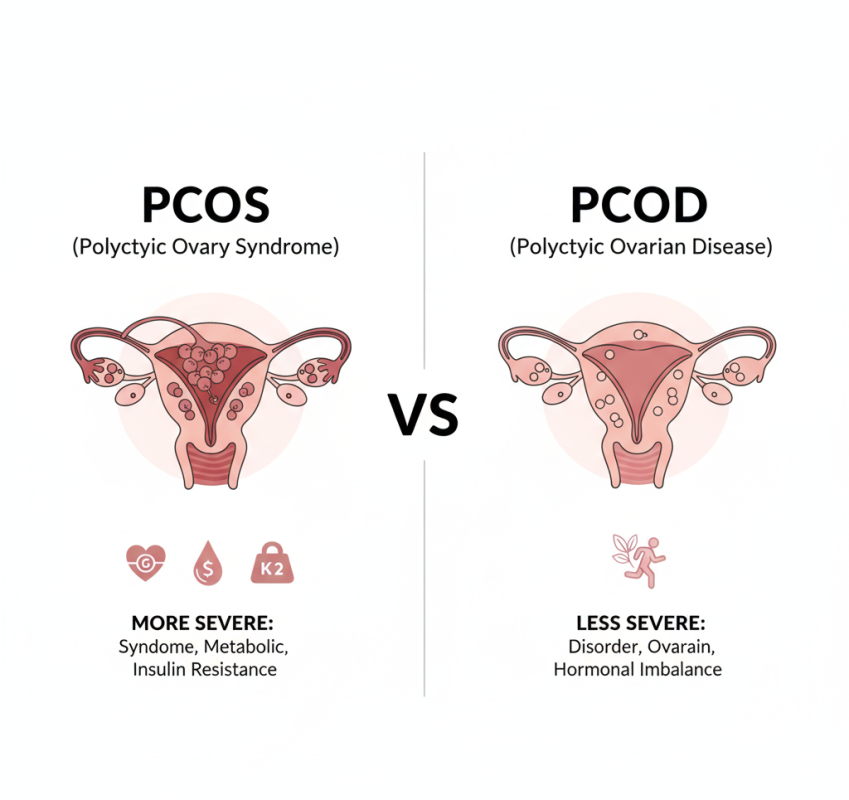No products in the cart.
HEALTH BLOGS BY FITBYNET
PCOS vs. PCOD: Understanding the Key Differences
What is PCOS?
PCOS (Polycystic Ovary Syndrome) is a hormonal and metabolic disorder that affects women of reproductive age (12 to 51 years). It leads to excessive androgen (male hormone) production, irregular menstrual cycles, ovarian cysts, and potential complications such as infertility, diabetes, and heart disease.
Many women may have PCOS without realizing it. Common symptoms include:
- Irregular or skipped periods
- Ovarian cysts
- Excessive hair growth (hirsutism)
- Weight gain
- Acne and oily skin
- Hair thinning or hair loss
What is PCOD?
PCOD (Polycystic Ovarian Disease) is a condition where the ovaries produce immature or partially mature eggs due to hormonal imbalances. These eggs accumulate in the ovaries, forming cysts and disrupting hormone levels. Unlike PCOS, PCOD is less severe and can be managed with lifestyle changes and medications.
Symptoms of PCOD include:
- Irregular periods
- Weight gain
- Acne and oily skin
- Excessive hair growth
- Hair thinning or hair loss
- Difficulty conceiving
PCOS Prevalence in India
Studies estimate that PCOS affects 3.7% to 22.5% of women in India, depending on demographics. Globally, 5% to 18% of women have PCOS, with 70% remaining undiagnosed. Early diagnosis is key to preventing complications.
Symptoms of PCOS & PCOD
Symptoms vary among individuals, but the most common include:
- Irregular or absent periods
- Heavy menstrual bleeding
- Excessive hair growth (face, back, chest, belly)
- Acne on the face, chest, and back
- Unexplained weight gain
- Hair thinning or hair loss
- Darkening of the skin (neck, underarms, under breasts)
Causes of PCOS & PCOD
While the exact cause is unknown, the following factors contribute to these conditions:
- Insulin Resistance – High insulin levels increase androgen production, disrupting ovulation.
- Excess Androgens – Elevated male hormones cause acne, excessive hair growth, and irregular cycles.
- Chronic Inflammation – Low-grade inflammation raises androgen levels and increases heart disease risk.
- Genetic Predisposition – PCOS and PCOD can run in families.
Complications of PCOS & PCOD
If left untreated, both conditions may lead to:
- Infertility
- Type 2 diabetes
- High blood pressure
- Metabolic syndrome
- Depression and anxiety
- Sleep apnea
- Endometrial cancer
- Miscarriage risk
PCOS vs. PCOD: What’s the Difference?
While both affect the ovaries and hormones, there are key differences:
| Feature | PCOD (Polycystic Ovarian Disease) | PCOS (Polycystic Ovary Syndrome) |
|---|---|---|
| Prevalence | Affects ~10% of women globally | Affects ~0.2% to 2.5% of women globally |
| Cause | Ovaries produce immature eggs due to lifestyle factors | A metabolic disorder causing hormonal imbalance and ovulatory dysfunction |
| Fertility Impact | Women can ovulate and conceive with minimal assistance | Makes conception difficult, higher risk of miscarriage and pregnancy complications |
| Severity | Less severe, manageable with lifestyle changes | More serious, associated with long-term complications like heart disease and diabetes |
Diagnosis of PCOD & PCOS
A gynecologist may recommend:
- Pelvic Examination – Checks for ovarian abnormalities.
- Blood Tests – Measures hormone levels, lipid profile, and glucose tolerance.
- Ultrasound Imaging – Assesses ovarian size, cysts, and uterine lining.
Additional screening includes:
- Blood pressure, cholesterol, and glucose monitoring
- Mental health assessments (anxiety, depression)
- Obstructive sleep apnea tests
Managing PCOD & PCOS Naturally
Although there is no permanent cure, lifestyle changes help manage symptoms effectively.
1. Maintain a Healthy Weight
- A BMI between 18.5 and 24.9 is ideal. Women with a BMI over 30 are at risk of complications.
- Even 5% weight loss can regulate ovulation and improve insulin resistance.
2. Follow a Low-Carb, High-Protein Diet
- Avoid refined sugars and processed foods.
- Include lean proteins, fiber-rich vegetables, and healthy fats like nuts and seeds.
3. Exercise Regularly
- Engage in 30 minutes of moderate activity daily (walking, yoga, strength training).
- Regular exercise improves insulin sensitivity and hormonal balance.
4. Manage Stress & Sleep Well
- Yoga, meditation, and breathing exercises help reduce cortisol levels.
- Maintain a consistent sleep schedule to regulate hormones.
When to See a Doctor
If you experience irregular periods, excessive hair growth, acne, unexplained weight gain, or fertility issues, consult a gynecologist for early diagnosis and treatment.
FAQs
1. Can PCOS/PCOD be cured permanently?
No, but proper medical guidance and lifestyle changes help manage symptoms effectively.
2. What is the best diet for PCOS/PCOD?
A balanced diet with high-protein, low-carb, fiber-rich foods is beneficial.
3. What is the best exercise for PCOS?
Strength training, yoga, and cardio exercises help regulate blood sugar and hormone levels.
4. Does PCOD turn into PCOS?
PCOD is a milder condition, but if left unmanaged, it may develop into PCOS with severe complications.
Final Thoughts
Both PCOS and PCOD impact reproductive health and hormonal balance. Early detection, lifestyle modifications, and medical guidance can help prevent long-term complications. If you suspect you have PCOS or PCOD, consult a doctor for personalized treatment and improve your overall well-being.

